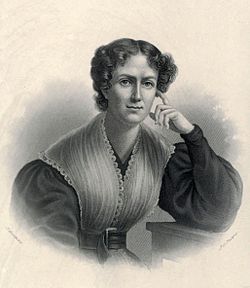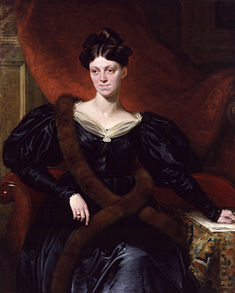Women in Philosophy
Part 2 of 3
In this post, I’d like to highlight two
historical female philosophers, Fanny Wright and Harriet Martineau, and their
ideas and the contributions that they made to the generally male dominated
realm of philosophy. Both women were extremely important, and while
controversial during their time, made strides for gender equality and women’s
rights, as well as encouraging secularism and free-thinking.
“Let us unite on the
safe and sure ground of fact and experiment, and we can never err; yet better,
we can never differ.”
Fanny Wright
(September
6, 1795 – December 13, 1852)
Frances Wright (or Fanny, as she liked
to be called) was born in Scotland in 1795, and orphaned at a very young age.
Her parents left her a large fortune, and she remained under the care of her Aunt,
being raised in both England and Scotland, and in the homes of various family
and friends – one of which was the Scottish philosopher James Milne. Fanny
vigorously pursued her philosophical studies, and by the age of 18 she had
written her first book. After traveling to America and visiting New Harmony,
Indiana (a socialist community, founded by Robert Owen), she decided to buy
land in America and started her own co-operative community to help transition
slaves into being self-sufficient after being emancipated, although the
community failed to blossom, and was abandoned in 1828.
Wright was an advocate of many ideas
that were quite radical during her time, such as universal equality between
genders and races, feminism, sexual freedom for women (and was an advocate for
birth control), and free public education. Wright was recognized and loved by
famous and important male figures of the time, such as Thomas Jefferson and
Andrew Jackson, both of which invited Fanny to their homes.
Wright was also the co-founder of the Free Inquirer newspaper, along with
Owen. Wright used this publication to share and inform the readers of her
opinions and philosophical beliefs, as well as addressing other areas of social
reform. In 1829, Fanny bought a church in New York City, which she converted
into what she called the Hall of Science, which celebrated free-thought and
provided a venue for lectures, debates, and other special events.
“Knowledge signifies
things known. Where there are no things known, there is no knowledge. Where
there are no things to be known, there can be no knowledge. We have observed
that every science, that is, every branch of knowledge, is compounded of
certain facts, of which our sensations furnish the evidence. Where no such
evidence is supplied, we are without data; we are without first premises; and
when, without these, we attempt to build up a science, we do as those who raise
edifices without foundations. And what do such builders construct? Castles in
the air.”
-
Frances
Wright
“It
is my deliberate opinion that the one essential requisite of human welfare in
all ways is scientific knowledge of human nature.”
Harriet Martineau
(12
June 1802 – 27 June 1876)
Harriet Martineau was born in England,
and raised as a Unitarian in a family of 8 children. She was encouraged by her
mother to be well read and educated, and had a very similar education of that
of her brothers, but yet was to remain in her place as a women of society and
not allowed to attend a university, and had a very strained, unaffectionate
relationship with her mother due to this. She had an article published
anonymously on this very topic, titled “On Female Education”, which one of her
brothers read without knowing that it was his sister who had written it. Upon
his discovery of the article’s author, he encouraged his sister to give up her
domestic duties and pursue writing.
Harriet continued her writing career,
writing a series of articles, and then later book illuminating social reform
and various other topics for the common reader, which were highly successful
and allowed her to become not only financially independent but quite wealthy. This
financial freedom allowed her to travel extensively, including trips not only
to America but to the Mideast to study religion, in which time she became an
atheist. Martineau was a strong supporter of abolitionism and women’s rights,
and through her writing became famous for her support of these efforts.
“A soul occupied with great ideas
performs small duties.”
-
Harriet Martineau
Both Wright and Martineau had
similar ideas about social reform and women’s rights, and it is because these
outspoken women set the stage that women are in the position to be taken
seriously as philosophers and thinkers in our modern world. Both Wright and
Martineau had very similar views to those who would be considered feminists
today, showing that they were both ahead of their time in their ideologies. Not
only did these women express their ideas, but their written work helped to
spread and preserve their principles, and by doing this they gained the respect
of their fellow male philosophers.
Next…
I’ll
highlight two of the many important and influential modern female philosophers.
Stay tuned!
Stay tuned!


No comments:
Post a Comment
Note: Only a member of this blog may post a comment.